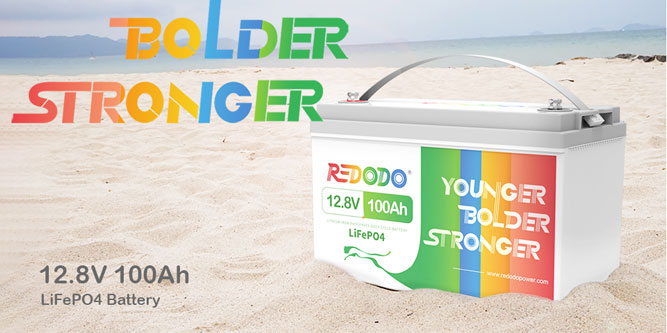If you’re using solar panels for power, congratulations! You’re contributing to the health of the planet. But solar panels have a major drawback; they only work when the sun is shining. This isn’t an issue if you’re connected to the grid.
Thanks to net metering, you can sell excess solar power back to the utility company during the day. At night, you’ll still be able to draw power from the grid. The same goes for cloudy days where your solar output is produced, or if your panels are covered with snow.
But what if you’re not connected to the grid? In that case, you’ll need to have a backup battery system. During the day, your solar panels will charge the batteries. At night, you’ll be able to draw power from them. You’ll have your own environmentally-friendly source of energy that operates 24/7.
Typically, homeowners will do this with an array of 12- or 24-volt deep cell batteries. Why 12-volt batteries? Because they’re a convenient size to work with. More importantly, they’re what most power inverters are made for. These batteries are easy to use without installing a bunch of complex, exotic equipment.
Of course, 12-volt batteries aren’t used only for off-grid houses. They can be used as backup systems for ordinary residences, for when the mains power goes out. You can also use them in series in an RV to provide 24-volt power when your engine isn’t running. You just need to find the best battery for the job.
Redodo 12V 100Ah LiFePO4 Deep Cycle Battery
Today, we’ll be reviewing the Redodo 12V 100Ah LiFePO4 Deep Cycle Battery. This is a compact, affordable battery that still has all the safety protections you expect from a deep cycle battery. It’s also surprisingly durable, with a 2,000-cycle duty rating and a 5-year manufacturer’s warranty.
But there are other factors that go into making a good quality battery. We need to examine the battery’s physical construction, and how well it’s put together. We’ll have to talk about the capacity, and how it can be wired into a larger system. We’ll also have to talk about what it’s capable of powering. After that, we’ll be able to render a fair verdict. Let’s begin!
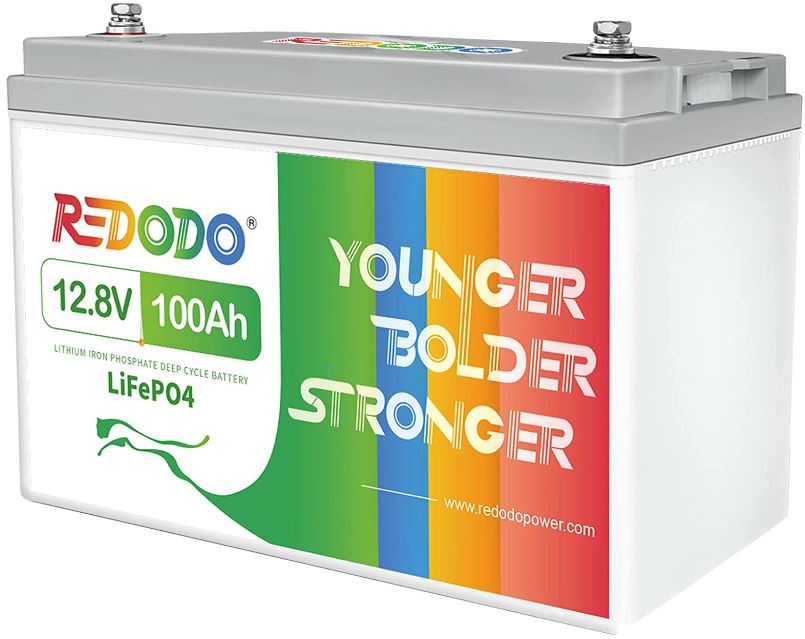
Overall Design
Like most 12-volt batteries, the Redodo 12V 100Ah LiFePO4 Deep Cycle Battery has a utilitarian design. It’s a rectangular block that measures 13 inches wide and 6.8 inches deep, and stands 8.5 inches high. It weighs a touch over 25 pounds, so it’s a bit heavy to lug around. Then again, it’s not like you’ll have to move it that open. Once it’s installed, it just sits there and does its job.
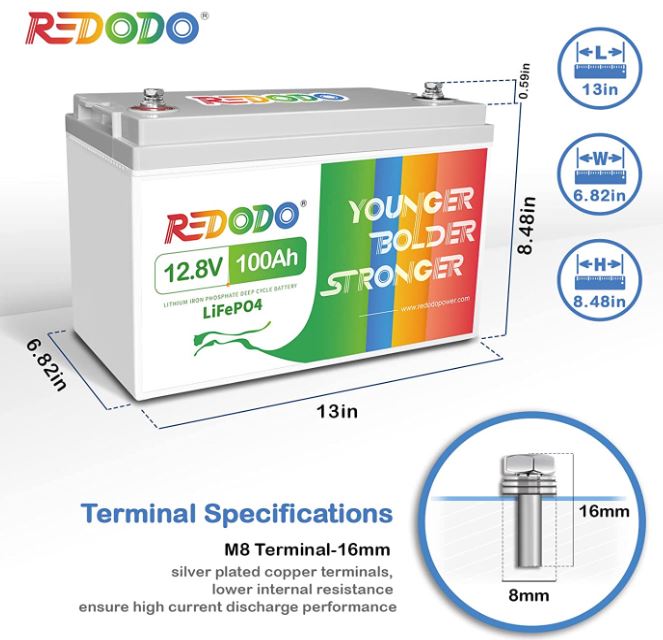
The bulk of the housing is constructed from a smooth white thermoplastic. It’s tough and as rugged as any good quality battery. We wouldn’t drop it on the ground on purpose, but it could probably take the abuse. The top of the housing is grey, with little cutouts in the sides for lifting it by. There’s a lot of rainbow Redodo branding that we could have done without. But ultimately, nobody cares if your 12-volt battery is ugly.
Furthermore, you can use the battery in damp environments. It’s IP65-rated for weather-resistance, which is pretty impressive for a battery. The 6 means that it’s entirely impervious to dust, which isn’t all that surprising. But the 5 indicates that it’s more than just splash-proof. You can actually hose it down to clean it off. Just keep in mind that we’re talking about a device with two exposed, live electrical terminals. Use common sense, and never get the battery wet on purpose when it’s wired into a circuit.
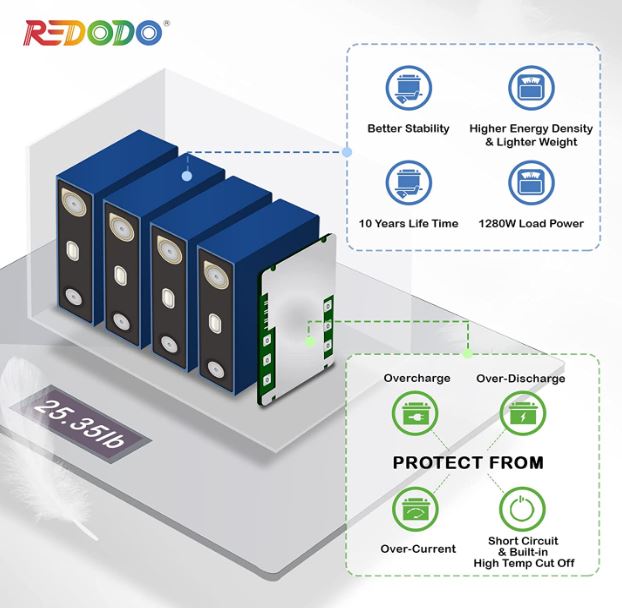
Installation
Installing the Redodo battery is a pretty standard affair. At the two front corners of the top panel, there’s a pair of metal terminals, which stand 0.6-inch high. These are simple threaded posts with nuts on them. You remove the nuts, attach your wires, and screw the nuts down on the terminals. That’s the same way most 12-volt batteries work.
You can also build more than one of these batteries into an array. You can wire up to four of them in parallel, for up to 12 volts and 400 amps of power. If you want to boost the voltage, you can wire it in series. With four wired in series, you’ll get 48 volts and 100 amps. You can wire up to eight batteries together in total. This means a practical maximum of 24 volts, 400 amps, or 48 volts, 200 amps. Either way, you’re looking at a maximum power output of 10,240 watts when eight batteries are used.
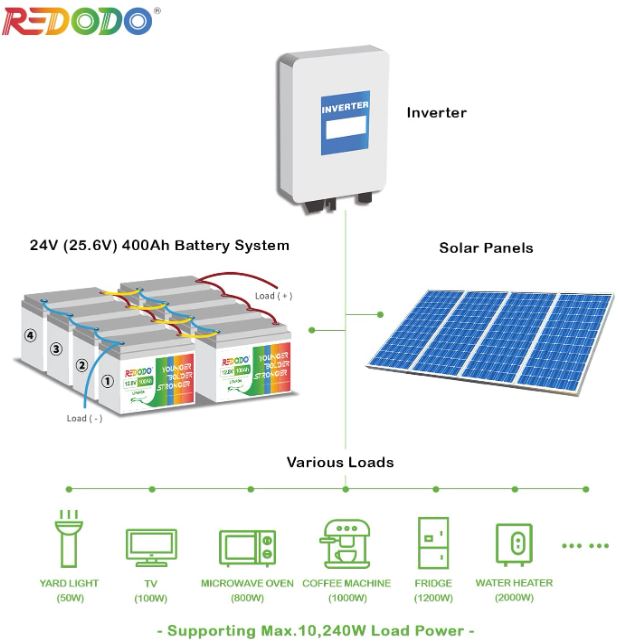
If this sounds a bit complicated, you don’t need to panic. Redodo offers 24/7 phone support for all of their customers. If you’re struggling with an installation, you can always call for help.
But what if you want a battery with different capabilities? If the Redodo battery doesn’t scratch your itch, there are plenty of well-engineered choices. Check out our list of the best 12V LiFePO4 batteries for our top suggestions.
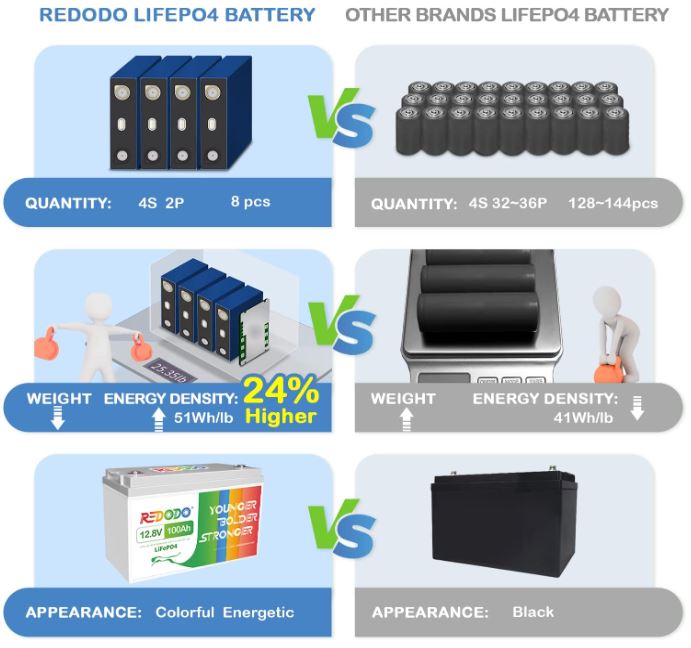
Capacity
The Redodo 12V battery has a maximum power delivery of 100 amps for a single battery. When wired in parallel, it will provide 200, 300, or 400 amps depending on how many batteries are wired in. At 12.8 volts, that’s a total of 1,280 watts or more, up to 5,120 watts with four batteries in parallel.
The same is true for the capacity. A single battery has a capacity of 100Ah. If you’re running a 1,000-watt griddle, that’s enough power for a little longer than an hour and fifteen minutes. However, if you’re wiring them in parallel, you’ll have 200Ah or 400Ah of capacity.
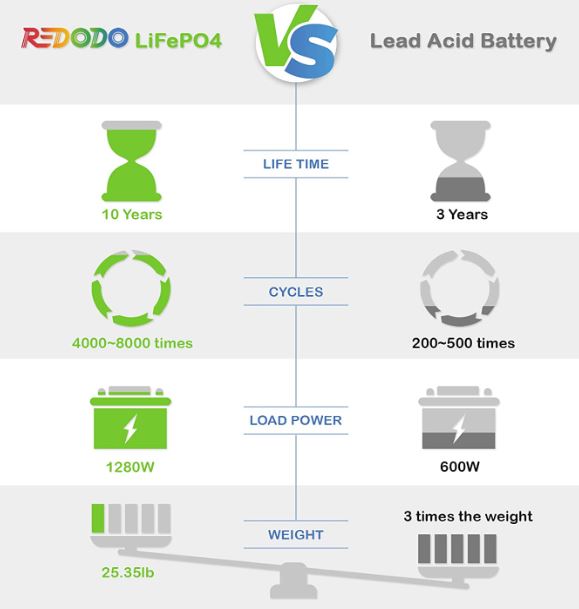
There are also larger versions of the Redodo battery with 200, 300, and 400Ah of capacity. If you were to wire four 400Ah batteries in parallel, you’d have a capacity of 1,600Ah!
If you’re looking for another large battery, consider the Power Queen LiFePO4 battery. It’s big and beefy, with a capacity of 300Ah and convenient carry handles on the side. Then again, it’s also correspondingly more expensive.
Performance
One thing we appreciate about Redodo’s battery is its durability. They provide different numbers for their duty cycle rating, sometimes advertising 2,000, sometimes advertising 4,000-8,000. However, they’re rated to retain 80% of their maximum capacity after 2,000 cycles.
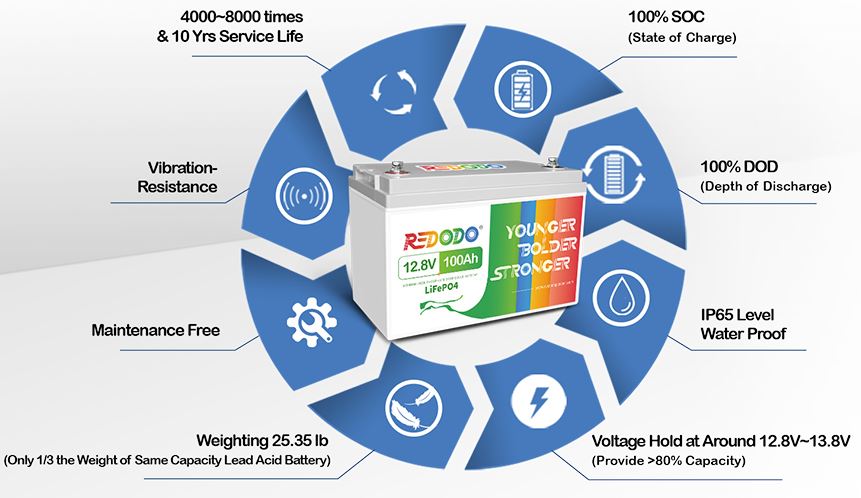
This is the industry standard way of measuring a duty cycle rating, so 2,000 is the more accurate number. Even so, you’re looking at a long-lasting battery. You also get a 5-year manufacturer’s warranty.
This battery has advanced safety features to protect itself as well as anything it’s wired to. To begin with, it has over-charge and over-discharge protection. If it’s fully charged, it won’t keep trying to draw power from your solar panels and damage its own cells. And it won’t discharge to the point that it becomes completely un-chargeable. Over-current protection will shut the battery down if incoming voltage exceeds 14.6 volts. Short-circuit protection will keep it from causing damage due to a crossed or damaged wire.
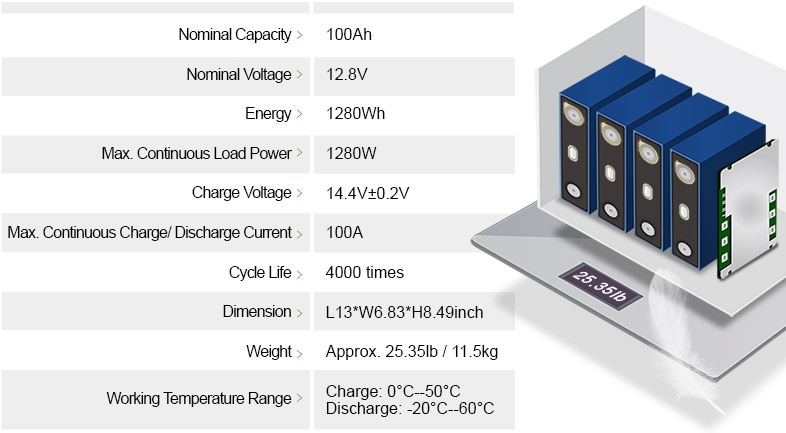
In addition, the Redodo battery has a temperature sensor that shuts it down if it starts to get too hot. You don’t have to worry about starting a fire because your battery got over-stressed. Unfortunately, there’s no low-temperature cutoff. Most modern batteries will automatically reduce their output when the temperature gets too cold. Because this battery doesn’t, it can over-discharge if used below 0˚F.
What Are the Benefits of LiFePO4 Batteries?
Before we deliver our verdict, let’s talk about LiFePO4 technology. What is it that makes this type of battery different from other types of battery, such as lead-acid or lithium? Here are some things to consider:
- LiFePO4 cells are more durable – They’re rated for a minimum of 1,000 duty cycles, and some are rated for as many as 10,000. This makes them popular for applications where replacing the battery is inconvenient. If you have an off-grid cabin, you don’t want to haul four batteries out there every year. These batteries can be used for years without needing any replacement.
- They have higher discharge rates – Traditional batteries like lead-acid batteries only discharge around 60% of their capacity. Below that, they start to deliver a weaker current. This is fine in some applications. For example, in a car, your alternator is constantly recharging the battery. LiFePO4 cells, on the other hand, discharge more than 99% or more of their maximum capacity. So when your battery says “100Ah,” you know you’re getting the full 100Ah.
- They’re low-maintenance – You don’t have to prime LiFePO4 batteries. You don’t have to top off electrolyte fluids and expose yourself to battery acid. They keep on working without any interference.
- They’re safer – Other types of batteries contain chemicals that can become volatile in extreme heat. In the wrong circumstances, this can even cause them to explode. LiFePO4 batteries are far less volatile.
What Are the Drawbacks of LiFePO4 Batteries?
LiFePO4 batteries are used in applications where reliability is essential. Besides off-grid power, they’re also used by hospitals and the military. From operating rooms to active battlefields to your hunting cabin, they’re as reliable as they come. That said, there are still situations where traditional lead-acid or lithium batteries are preferable. Drawbacks of LiFePO4 batteries include:
- They have a low energy density – To store a lot of energy, you need a large, heavy battery. They can’t be used in phones, laptops, or other portable devices. At present, the smallest LiFePO4 batteries are used on electric bikes and scooters.
- They’re easier to damage – LiFePO4 batteries are susceptible to drop damage. This isn’t an issue when they’re properly mounted. But if you’re carrying them around, they could get dropped and broken.
Final Verdict
The Redodo 12V 100Ah LiFePO4 Deep Cycle Battery is a well-engineered deep cycle battery. It’s tough enough to take a beating, and weather-resistant enough for outdoor use. It can be built into a larger battery bank, or used by itself. It also has a number of safety features, and is rated for 2,000 duty cycles. If you need an affordable 12-volt battery, this is an excellent choice.
Meet Ry, “TechGuru,” a 36-year-old technology enthusiast with a deep passion for tech innovations. With extensive experience, he specializes in gaming hardware and software, and has expertise in gadgets, custom PCs, and audio.
Besides writing about tech and reviewing new products, he enjoys traveling, hiking, and photography. Committed to keeping up with the latest industry trends, he aims to guide readers in making informed tech decisions.

